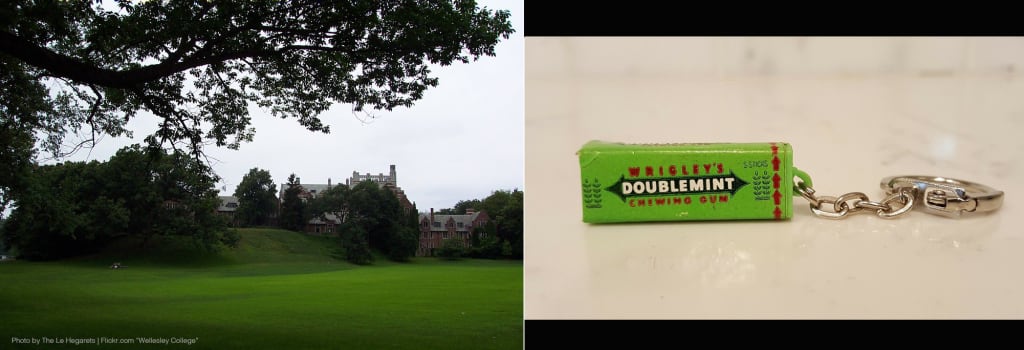Capture the Flag
After the game, I never considered hostile territory.

The summer program I went to after the seventh and eighth grades became fodder for my dreams way past late childhood when I had been a participant, right up until my adult years when I was trying to figure out what to do with my own kid for the month of July. It was billed as a pre-college program, the kind of thing that made my son shake his head and wonder out loud how I could be his mother. No, he did not want to do extra work for fun during his vacation, he let me know. I admit, I really had been excited about the courses I took on that old New England campus, but the biggest attraction wasn’t the academics, even though I got to do things like design and build model houses out of foam core in the architecture studio. The real draw was being set free on a college campus at the age of thirteen for three weeks without too much supervision.
The thing that ignited my imagination and made it into my dreams so many years later was Capture the Flag. I had played it in gym before and didn’t think twice about it then. But on the first day of my first year at this program, before I knew anybody at all, I was tossed into an game spanning several lush acres with a few dozen young teenagers strategizing and making elaborate schemes, in what seemed to be a weird prelude to our future, more grown-up college selves who would live in dorms like the ones right before us.
I plotted an attack with a black-haired girl with green eyes, who was wearing a Wrigley’s Spearmint Gum plastic charm with her room key on a string around her neck. Her name, I learned, was Beth, and she would become one of my best friends during my two summers at the program. We evaded the other team, sized up the competition, took note of the cute boys, and met our teammates while trying to carry out stealth maneuvers through the thicket of trees.
In the years to come, Capture the Flag became my dream notation for endless possibilities, for surveying a psychological landscape, and for creating the reality you wished for. And Beth’s bright green plastic chewing gum ornament always made an appearance: the harbinger of a new friend, an unopened door beckoning.
In real life, weeks at the program flew by, filled with dorms and dining halls and trips to Boston, so different than my regular small-town world. I was in control of what I wanted to do, and it seemed like absolute freedom, with all new faces and stories, bands I’d never heard of, and even new ways of speaking. My roommate, Monica, and I became good friends, and with Beth, we became a circle of three, soon gathering several other girls into our group—a ready-made clan of new buddies.
I knew right from the start I wanted to come back the next year. I was fourteen during my second summer. Beth had flown up to New Jersey to visit me from Florida during the year and we felt as close as we had been during the program. Before my second summer started, Monica asked if I wanted to go home with her after the program ended. It sounded perfect—we would prolong our three weeks of fun at her house, before flying together to my home in New Jersey.
I never worried much about meeting people, and I assumed that Monica’s family would be something like Monica—friendly, funny, and not too different than the other families I knew. I also assumed that Monica would be like Monica, or at least the Monica I was acquainted with. And this is where my fish-out-of-water story begins.
Monica’s mother, Elaine, picked us up from the college campus. She didn’t set off major alarms in my mind on the hour-long trip to their home, though I noted how she bragged about her two daughters' beauty and remarked comparatively about the size of their boobs, as she referred to them. Weird, I thought, but whatever. As soon as I stepped inside their house and met Monica’s sister, Ricki, who was a year older, I knew I had made a mistake to come.
Ricki was eager to show her mom and sister some new things she had just gotten and she herded the three of us into her bedroom. She emptied a backpack full of goods on the bed, and the three of them began laughing, all of them seemingly in on some joke. There were eyeliners and mascara, scrunchies and a pair of jeans, perfume, and some costume jewelry.
“Why are you guys laughing?” I asked. “Are you a big shop-a-holic or something?” I asked, trying to make conversation and get my bearings on where they were going with all of this banter.
“More like klepto-holic!” Monica answered, all of them still laughing. WAIT, WHAT? I thought in complete disbelief, or maybe I actually said it out loud, because Monica began to elaborate. “She shoplifts everything—she always gets away with it!”
I looked at Elaine, their mother, in disbelief. “You’re okay with this?” I asked her tentatively, not fully sure if they were all just pulling my leg to see what I would say.
“Oh, sure!” she answered. “It means I don’t have to pay for it!” she cackled. I felt like the theme from Twilight Zone was starting to play in my head.
Right as I was dealing with the shock of the realization of what a bizarre family I had walked into, Monica and Ricki were making plans to show me their favorite outdoor mall.
“I’m not really into malls,” I lied. It was the 80s. No one was going to believe that.
“This one is really cool,” Monica insisted. “You’ll really want to see it.” It was a done deal. The three of them thought that of all the things I should become acquainted with in this New England town that I had never visited before, the outdoor mall was at the top of the list. We got back into Elaine’s car and she shuttled us to the kind of shopping center that exists in every town in America with at least 20,000 people. Except this one had a Filene’s, which apparently Monica and Ricki were enthusiastic about. It was a good place to steal stuff.
I had never stolen anything in my life and I had no desire to start then. Monica addressed the situation to Ricki like she was briefing a dinner party hostess who was about to serve lambchops that there was a vegetarian in their midst.
“Kim doesn’t really steal stuff,” she said in confessional tones, like I was her geeky friend—which I was, refusal to steal having nothing to do with it. Ricki did some eye-rolling, or at least she did in my memory.
“Okay, dipshit, you go stand outside and wait for us and we’ll be out in a little while,” Ricki directed. She actually didn’t call me dipshit, but she may as well have. I sat on the edge of a white concrete planter and thought about how I could possibly call my mom from their house to come rescue me without anybody hearing me. Of course there were no cellphones at that time, just a family landline. I was already counting down the days until I left and I hadn’t even spent a night there yet.
I don’t actually remember when this next conversation came up, but I’ll stick in here, after the sisters came out of Filene’s with their contraband, herding me along the shopping plaza to their next destination. “Should we tell her about Dad?” Monica asked Ricki. Oh god, I thought—what about Dad?
“Oh,” Ricki started hesitatingly. “Well, our dad is kind of funny. He likes to walk around naked at night…” By then the blood was rushing to my head and I could barely think straight. Great, a potentially naked father— what next? I made a mental note not to get up in the middle of the night no matter what—no bathroom, no water, nothing. It struck me as odd that Monica and Ricky realized this was wacko enough to warn me about it, but not wacko enough to avoid inviting me to stay at their house. But the part I really kept replaying in my mind over the years was still yet to come.
It happened at dinner. There was another sibling—a brother, Lance, who was going into his senior year of high school. He actually wasn’t a bad looking guy, but the rest of the family treated him like he was egregiously ugly and mentally deficient, too, in spite of the fact that he wanted to go into automotive engineering. He seemed to have assumed the role they assigned him. They all ganged up to make fun of his passion for drawing cars, pretty much the way a callous family might respond to a little boy who played with dolls—like it was a pathetically embarrassing hobby. Lance hung his head as he sat at the table. This was in the days before bullying was a noun, but the way this family treated their own son and brother made me desperately want to name their cruelty and let Lance know that this was not normal. And his drawings were actually pretty good.
“I think they’re really cool!” I piped up. “Maybe that’s what you’ll end up studying in college.” I tried to throw him a life-line. His family all intercepted it.
“Oh, this is just perfect!” Ricki started in. “You have a crush on Kim and now she’s being nice to you, so you’re going to like her even more, but she’s never going to like a loser a like you!” His parents and Monica roared with laughter. Lance cracked and broke down crying, before he picked up a roll from his plate, threw it at Ricki and stomped off to his room.
I had never experienced such meanness in my life, let alone from a person’s own family. What threw me the most was how Monica could have appeared to be one of us among Beth and me and all our goofy, sweet friends at the summer program. How could I have not picked up on any signs? And how would Monica know how to hide all of her negative traits from us, yet be so willing to fall in line with the vicious propensities of her family?
That phone call to my mom couldn’t wait. But when could I do it? I couldn’t venture out of Monica’s room at night, lest I run into her father. I would have to wake up super early before anyone else was up to make my phone call in private. I was determined to wake up at dawn and slip downstairs, but first I’d have to fall asleep in what was feeling more and more like an insidious insane asylum, pretending to think nothing of it. Monica's family blasted the air-conditioning in their house, the kind of cold that my thin cotton blanket was no match for. I knew I would be covered in goose bumps, struggling to fall asleep while fighting the urge to make a run for the bathroom.
I probably never fell into a dead sleep that night and I definitely didn’t need an alarm to jump out of bed as soon as the first glimmers of light poked into the room. I knew my mom, an early riser, would be up, but she would be surprised to hear from me at this hour. I tiptoed down to the kitchen, making sure I didn’t hear anyone up. It seemed all clear. I picked up the receiver on the wall phone, sat down at the table and positioned myself so I could see if anyone was coming. I dialed and my mom picked up.
“Mom?” I whispered.
“Kim! What’s wrong?” she responded.
“You’ve got to come get me—they’re weirdos...and they steal! I’m okay, but you’ve got to get me out of here as fast as you can! I’ll explain later,” I answered. I knew I could count on my mom.
“Okay,” she said. “But you and Monica have plane tickets for Saturday…”
“Please think of something…ANYTHING!” I begged. I was not a kid who ever experienced home-sickness. I rolled with the punches. My mother must have been overwhelmed with worry about my request.
“Got it,” she said. “We’ll work it out.”
Later in the day, Elaine received a call from my mom, who explained that my grandmother’s minor surgery had been pushed up to that Friday, and that my grandma asked to stay with us beforehand and wanted to see me. She asked if it would be okay to switch our plane tickets for tomorrow. What could Elaine say? I don’t know how my mom pulled off switching the tickets, especially for a minor who was someone else’s kid, but she did it, and to my great relief, I got out of there in two days. I really wanted to be free of Monica, who acted like it was a great loss to leave her home earlier than planned, but there was no way to escape without her. For whatever reason, she wanted to come.
When I look back on that summer, I think the contrast between my two experiences are what made the short family stay all the more unbearable. At the college program, I felt blessed with an adult-like autonomy and the sense that I was surrounded by so many like-minded kids who were apt to become friends at any moment. Yet just the opposite was true when I went home with Monica—all my options were cut short and I felt trapped with this morally discomfiting family.
I hadn’t applied what I had learned from Capture the Flag: I did no psychological reconnaissance and I let myself get cornered in hostile territory with no way out, except for a deus ex machina in the form of my mother willing to tell a tale to rescue me. And that was my takeaway: drastic situations may call for drastic measures. There’s a right time to tell a white lie (or a big old whopper) if necessary to save your well-being or that of your child. Get out by any means necessary, was what I learned, my polite reservations not withstanding. And teach your children to do the same.
I don’t know what Monica and her family must have thought about me after we left, but I realized it didn’t really matter. Unsurprisingly, Monica copped a sour attitude during the time we were at my house, but I was already so far removed from that friendship that I was only letting the timer run out—with an obligatory coinciding stay by my grandma.
Every once in a while I wonder what happened to Lance, if decades of therapy might have saved him, if he became more like his family, or if his life took a darker turn. I’m still a trusting person, but in thinking about Monica, I remember that people can present themselves to resemble a reflection of you, when in truth, they don’t share any qualities with you at all.
On the other hand, though I’ve never seen such an actual keepsake again, I keep an eye out for the metaphorical equivalent of a spearmint chewing gum charm around someone’s neck. Sometimes you just know someone is destined to be in your life for the long haul, a new old friend, all your self-protective strategies and tactical know-how be damned.
About the Creator
Kim Sillen
Kim Sillen is an artist, activist and graphic designer who lives on the Lower East Side of Manhattan. She is interested in the role art and design can play in influencing public policy by mobilizing communities.






Comments
There are no comments for this story
Be the first to respond and start the conversation.